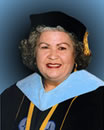


Program information
The Sylvia M. Thomasson Educational Leadership Enhancement Program provides an avenue for the identification of future leaders in Florida’s community college and state university system.
[The program] forces you to evaluate leaders in your life and the leader you are or will become.
-- Sandra E. Anderson
Assistant director, admissions and student records, PHCC
The program specifically addresses the need to identify women and minorities who may become future leaders in the Florida community college and state university system. Participants engage in a series of leadership activities that include a state conference or convention and a trip to Tallahassee to acquaint them with the legislative process as it relates to the community college system. Participants are selected by their individual colleges based on their goals and and potential for becoming future administrators.
Statement of purpose
This leadership program is designed to strengthen the executive management preparation of women and minorities. Additionally, the program will give women and minorities an opportunity to explore specific career paths in post secondary education. The need for this program is well documented at each of the participating institutions. The need to identify minority applicants, in particular, is becoming increasingly more important. This program creates a “grow your own” concept.
Consortium
The educational leaders of Central Florida Consortium (CF, LSSC and PHSC) will identify up to 12 mid-management and/or faculty members who are a minority and/or women to participate program.
Each month there are structured, planned sessions for all participants. One of the major components of the program is an emphasis on “Servant Leadership.” This concept is “being applied by a growing number of individuals and institutions as both a philosophy and a working model.” Spears, 1994.
I participated in a dialogue with three community college presidents...
-- Trish Glennon
Coordinator, benefits and special projects, CF
In “Servant Leadership,” project participants will learn how to utilize a group-oriented approach as a means of decision making to strengthen their institution and improve society. Ideally, each participant will learn to put into practice effectively the seven key elements of servant leadership.
Participants will take part in the following leadership activities:
- A trip to Tallahassee during the legislative session
- Six professional development workshops
- Review and discussion of literature on leadership
- Be mentored by a senior-level administrator at their college
- Shadow a senior-level administrator at their institution or one of the participating institutions
- Attend the Presidents’ Forum
- Select and complete a major leadership project based on their interest
Servant leadership
Servant leadership is now in its third decade as a specific leadership concept. Robert Greenleaf conceived the belief that: “The servant leader is servant first... it begins with the natural feeling that one wants to serve, to serve first. Then conscious choice brings one to aspire to lead.” The best test for this is: “Do those served grow as persons; do they, while being served, become healthier, wiser, freer, more autonomous, more likely themselves to become servants?” (Robert Greenleaf) Through his philosophy, ten characteristics of servant-leaders are predominant: Listening, empathy, healing, awareness, persuasion, conceptualization, foresight, stewardship, and commitment to the growth of people and building community.
Do those served grow as persons? Do they, while being served, become healthier, wiser, freer, more autonomous, more likely themselves to become servants?
-- Robert K. Greenleaf
The Servant as Leader
Built upon Robert Greenleaf’s beliefs, the Greenleaf Concept was created to further his mission to support those who, through the practice of servant leadership, seek to create organizations in which individual stakeholders become healthier, wiser, freer, and more autonomous; and in so doing, build a better, more humane society which welcomes the full diversity of human family.
Program participants will be introduced to different styles of leadership and will learn how one can apply servant-leadership principles at work and at home. Self-assessment and accountability are also important facets. Individuals are asked to take measure of themselves in administrative leadership roles, both designated and situational. For example, participants in the Sylvia M. Thommason Educational Leadership Enhancement Program are encouraged to learn how to deal with the rapid changes occurring in higher education and how discerning values of the institution becomes the focal point for change.
Selection process
When Sylvia Thomasson was the vice president of Educational Services at LSSC, she made the selection herself; no applications and no meetings. After determining who would participate, she went to that person and talked with them on an individual basis. Dr. Thomasson told the person she wanted them to participate, why she selected them, and how the program would benefit them professionally.
Currently each participating community college has chosen a different method for the selection of staff members and faculty who will participate in the Sylvia M. Thomasson Educational Leadership Enhancement Program.
Participants in the Sylvia M. Thomasson Educational Leadership Enhancement Program are required to attend all mandatory sessions (Orientation, Fall Conference, Presidents’ Forum, and Summer Conference) and will be allowed to miss only one regular session (with approval of the participant’s college coordinator) in order to receive a certificate of completion in the program. If a prospective participant is unable to meet this requirement, please inform your college coordinator prior to confirmation of acceptance in the program.
College of Central Florida
Each CF vice-president recommends a member or members of his or her staff who would be an appropriate person to participate in the leadership enhancement program. The president’s staff reviews each nominee and invites the nominees to participate by giving the nominees an application to fill out. The president then reviews the applications and then makes the selection.
Lake-Sumter State College
LSSC employees who have interest in the leadership enhancement program must complete an application during the early part of the fall term. The application covers community college experience, educational background, career goals, and the individual’s perception of critical issues facing community colleges. The applicant must select two of the defined issues and describe how they would address the problem. The written application information is then shared with the president’s council and a selection is made.
Pasco-Hernando State College
PHSC applicants complete a program application, which includes short essay questions. Applications are submitted to the continuing education specialist, who, as chair of a screening committee, reviews the applications. Recommendations from the screening committee are sent to the president’s administrative leadership team. The president’s administrative leadership team approves program participants.
Thursday, July 31, 2025
